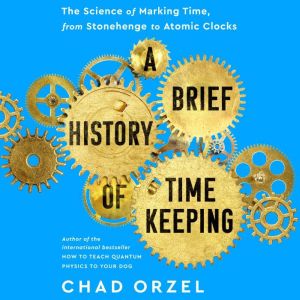

A Brief History of Timekeeping
The Science of Marking Time, from Stonehenge to Atomic Clocks
Author: Chad Orzel
Narrator: Mike Lenz
Unabridged: 12 hr 28 min
Format: Digital Audiobook Download
Publisher: Highbridge Audio
Published: 01/25/2022
Categories: Nonfiction, Science, Time, History, World History
Synopsis
Chad Orzel, a physicist and bestselling author, continues his tradition of demystifying thorny scientific concepts by using the clocks and calendars central to our everyday activities as a jumping-off point to explore the science underlying the ways we keep track of our time. Ancient solstice markers depend on the basic astrophysics of our solar system; mechanical clocks owe their development to Newtonian physics; and the ultra-precise atomic timekeeping that enables GPS hinges on the predictable oddities of quantum mechanics.
Along the way, Orzel visits the delicate negotiations involved in Gregorian calendar reform, the intricate and entirely unique system employed by the Maya, and how the problem of synchronizing clocks at different locations ultimately required us to abandon the idea of time as an absolute and universal quantity. Sharp and engaging, A Brief History of Timekeeping is a story not just about the science of sundials, sandglasses, and mechanical clocks, but also the politics of calendars and time zones, the philosophy of measurement, and the nature of space and time itself.


